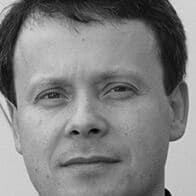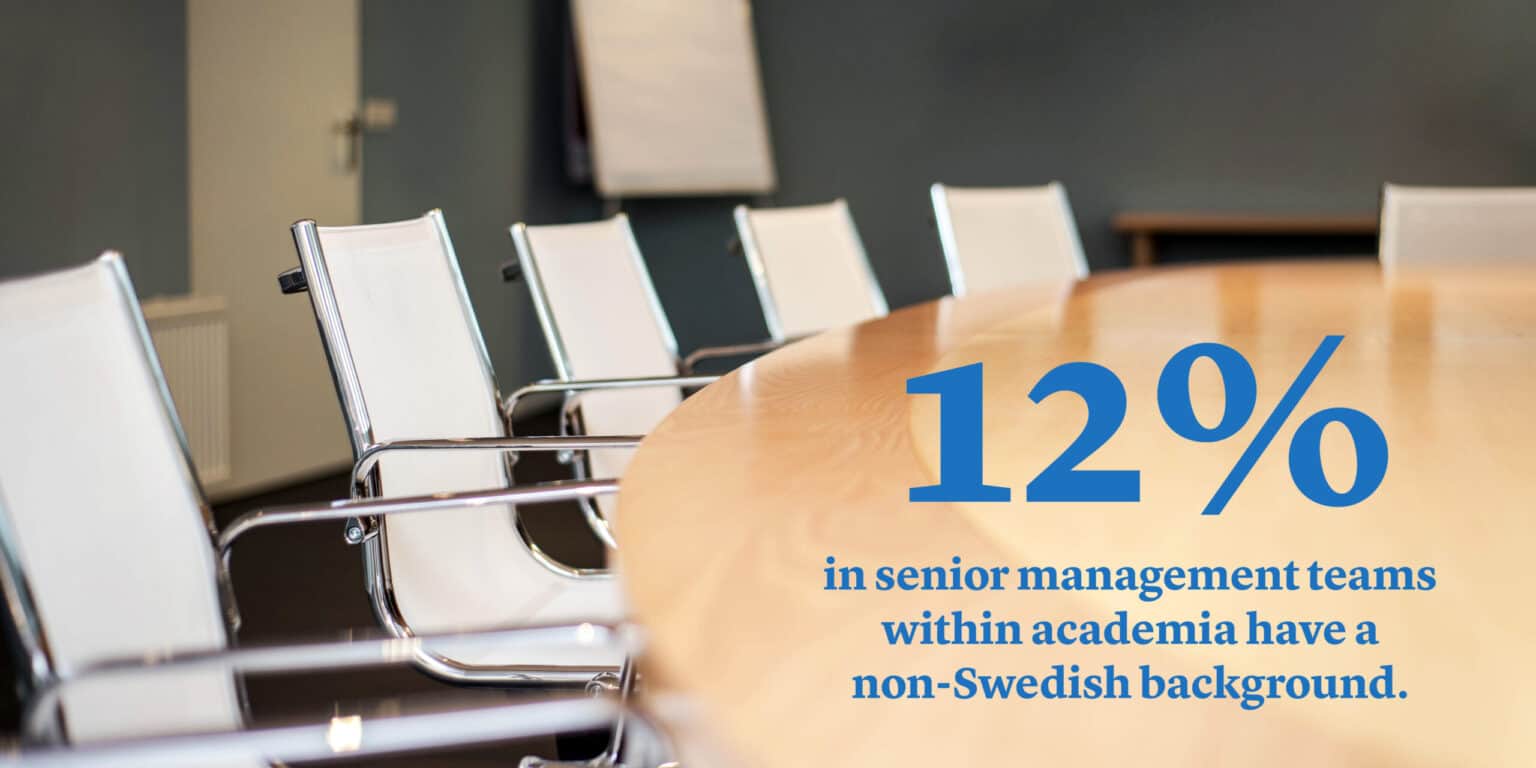Statistics Sweden, SCB, defines a person with a foreign background as either someone born abroad or someone born in Sweden with two foreign-born parents. This definition applies to 31 per cent of Sweden’s population.
One of the various sub-goals set by the government for state employers is that the proportion of employees with foreign backgrounds is to increase, and this applies at ”all levels”. According to figures from the Swedish Agency for Government Employers, 34 per cent of people working in higher education have foreign backgrounds.
Different at management level
Things look different in senior management teams in the higher education sector, however, where 12 per cent have foreign backgrounds according to research by Universitetsläraren. More than a quarter of these have their backgrounds in the Nordic countries: Iceland, Norway, Denmark or Finland.
Using Statistics Sweden’s definition, there is no person with a foreign background in the senior management team at Dalarna University. Michail Tonkonogi, chair of the Saco-S section at Dalarna University, says that he has seen four senior management team constellations since he started working there.

“I find it very difficult to see why it has not been possible during that time to find a single person with a foreign background who could join our senior management team,” he says. “It can only be a structural problem.”
People with different backgrounds bring different experience and insights, which is a reason to bring in more people with foreign backgrounds even at the highest management level, Tonkonogi believes. “Diversity is never wrong. If it doesn’t have that perspective, I don’t think the management will be as effective.”
Importance of heterogeneity
The Vice-chancellor of Dalarna University, Martin Norsell, regrets that he has not managed to recruit anyone with a foreign background to his management team.
”Unfortunately, the boring answer is that there is no quick fix for this issue. We need to look at the structures,” he says.

Norsell believes that heterogeneity in management teams is every bit as important as it is in other groups. “There is plenty of research that shows that heterogeneous groups are more effective in the longer term. The more perspectives you can bring in, the better.”
In order to increase the proportion of people with foreign backgrounds in management positions in the long term, Dalarna University, and higher education as a whole, must continue to recruit based on competence and work progressively to bring ”more people with foreign backgrounds into the system”, he believes.
“Exactly how long that will take is difficult to say,” says Norsell. “Right now, for example, we have one deputy head of department with a foreign background and in other places we have section heads, so we have made some progress at that level.”
What responsibility do you as vice-chancellor have to bring people with foreign backgrounds into senior management?
“The most important role I have is to ensure that we recruit based on competence,” says Norsell. “That is what drives the university forward and must be priority number one. No exceptions can be made to that principle.”
Management teams made up of people with different backgrounds and experience is important for the sake of representation, says Linda Wedlin, professor of business administration at Uppsala University. She researches organisation and governance of the public sector.
“It has both symbolic value and practical value,” she says. “People can see that there are opportunities to influence. Otherwise, it can be self-excluding, that people think that being in management is only for ”others”.”

Other perspectives
Increased diversity also gives prominence to different matters, she believes, issues which might otherwise be given less focus.
“In terms of research, you can also imagine that there will be different perspectives if there are people with broad experience and who also represent those who are outside the organisation,” says Wedlin.
Representatives of the state
Mid Sweden University is another higher education institution that has no people with foreign backgrounds in its senior management team. Ummis Jonsson, chair of the local Saco-S and SULF association at the university, thinks it is important that the composition of both the staff and management team reflects society and the population at large.
“It’s important for us as representatives of the state,” she says. “We live in a multicultural society and that must be reflected.”

She adds that this can be difficult to live up to. “When appointing people to the management team of a university, certain formal academic requirements need to be fulfilled. We have a collegial appointments process for our academic managers, but other managers are also appointed based on merit and in competition with others.”
The employees choose
This means that fundamentally it is the employees who have chosen the academic representatives in the management, and it is from these that the vice-chancellor then appoints the senior management team together with other key managers, she says.
“The team we have now is a very homogenous group, and I believe we always need to strive to improve. But there is no quick-fix solution.”
In Jonsson’s view, there are several reasons why Mid Sweden University in particular has no people with foreign backgrounds in its management team. The geographical location, for example, may mean that the population structure is more homogeneous compared with other parts of the country. “Although we have a fairly large proportion of doctoral candidates with foreign backgrounds, few of them choose to stay in the long term,” she says.
Vice-chancellor surprised
Anders Fällström, the vice-chancellor of Mid Sweden University, is surprised that 12 per cent of senior management teams at Swedish higher education institutions have foreign backgrounds.
“I actually thought the figure would be even lower,” he says. “But having said that, it’s still really bad. The more perspectives you can bring into discussions, the better. That is how a university should be run.”

He says that Mid Sweden University not having a single person with a foreign background in the senior management team is regrettable.
Why is it like this?
“There has been too little mobility among our teachers and researchers. The influx is simply too small. Much is down to historical factors. There has been very little external recruitment to the university, especially internationally. Although things have improved, it takes time for people who might be suitable for leading positions to come up through the system.
How big is your own responsibility to turn this around?
“It’s very big, because in practice I am the one who appoints the senior management team. Then again, maybe there wasn’t much we could about it this time around. But the responsibility for working with this in the long term is mostly mine,” says Fällström.
David Rule is chair of the SULF association at Linköping University, where there is no person with a foreign background in the senior management team either.
“I don’t think that you should appoint members of the senior management team on the basis that you should aim for an even distribution, either when it comes to gender or background,” he says. “Appointments should be made on merit. At the same time, it could be a sign that something is wrong systematically and that we need to review how we employ people.”

Constrained by collegiality
Linda Wedlin does not think that vice-chancellors can be held solely responsible for the low number of managers with foreign backgrounds in senior management teams.
“The vice-chancellor is to some extent constrained by collegial factors, and has the managers that the collegium appoints. But even in this system, we must of course examine what it is that means these particular people get appointed and not others.”
She thinks it is reasonable to place clear demands on higher education institutions. “We have a democratic mission, and must show that we take that mission seriously,” she says. “Showing that we are capable of creating systems that utilise international competence is one of the ways we can do that.”
Greater gender equality
If we look at gender, distribution looks different compared with when we look at foreign backgrounds. Universitetsläraren’s analysis shows that there are 164 women and 169 men in the senior management teams of higher education institutions.
Michail Tonkonogi, chair of Saco-S at Dalarna University, thinks that speaks volumes. “It’s quite exciting to see that we are so good when it comes to gender balance, while not giving the same amount of attention to whether a person has a foreign background or not,” he says.
Linda Wedlin is not surprised that the picture for gender balance in management teams is better than that for foreign backgrounds. She says that we can’t just wait the problem out, and points out that over time more people with foreign backgrounds will take up management positions.
“I actually think that, just like when it comes to gender equality, it will be the result of hard work,” she says. “We have to work with broader recruitment, both when it comes to students and teachers.”


















